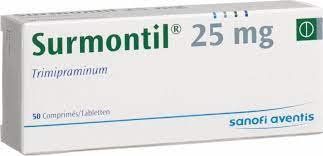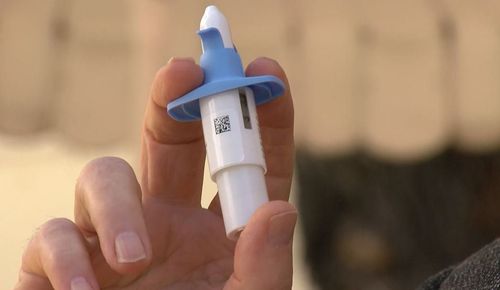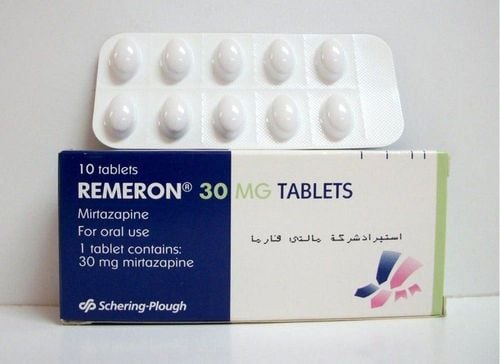This is an automatically translated article.
Jewell has the active ingredient Mirtazapine as the main active ingredient. The drug is used in the treatment of major depressive episodes. However, side effects of Jewell can occur if you use it the wrong way.
1. What is Jewell? What does Jewell do?
1.1. Pharmacodynamic properties Jewell is a centrally active presynaptic a2-antagonist that increases central noradrenalin and serotonin-mediated neurotransmission. The enhancement of serotonin-mediated neurotransmission is only through specific 5-HT1 receptors. This is because the 5-HT2 and 5-HT3 receptors are blocked by mirtazapine. Both enantiomers of the active ingredient Mirtazapine are thought to participate in antidepressant activity, the S(+) enantiomer blocking a2 and 5-HT2 receptors and the R(-) enantiomer blocking 5-HT3 receptor.
The histamine H1 antagonist activity of the active ingredient Mirtazapine is related to its sedative properties. Mirtazapine is generally very well tolerated. The drug has almost no anticholinergic activity and in therapeutic doses has almost no effect on the cardiovascular system.
1.2. Pharmacokinetic properties Mirtazapine is rapidly and well absorbed with 50% bioavailability, reaching peak plasma concentrations after an interval of 2 hours. Approximately 85% of Mirtazapine is bound to plasma proteins.
Mirtazapine is extensively metabolised and is excreted in urine and feces within a few days. The major biotransformation is demethylation and oxidation, followed by conjugation. The demethylated metabolite is pharmacologically active and appears to have the same pharmacokinetic properties as the parent compound.
The mean half-life is about 20-40 hours. Jewell drug concentration reached steady state after 3-4 days, then no further accumulation. Clearance of the active ingredient Mirtazapine may be reduced due to renal or hepatic impairment.
1.3. Indications of the drug Jewell The drug is used in the treatment of severe episodes of major depression.
2. Side effects of the drug Jewell
Increased appetite and easy to gain weight. Drowsiness or sedation, usually occurring during the first few weeks of initiating treatment. However, reducing the dose usually does not reduce the sedative effect, but may reduce the antidepressant effect of Jewell. In rare cases, the following undesirable effects may occur:
Postural hypotension; Occurrence of mania; Convulsions, tremors, muscle tremors; Edema and accompanied by rapid weight gain; Acute bone marrow suppression manifests as eosinophilia, agranulocytosis, agranulocytosis, aplastic anemia; Increased serum transaminase activity; Rash on the surface of the skin. You need to inform the treating doctor about the unwanted effects that may be encountered when using Jewell.
3. Usage and dosage of Jewell
3.1. How to use Jewell Medicine Jewell is taken orally, taken with water and taken care not to chew the tablet. Patients need to take Jewell antidepressants at the same time every day. The best time is to take a single dose at bedtime. However, your treating doctor may also order you to split the dose - take one dose in the morning and once at night before going to bed.
Usually, Jewell depression will start to work after 1-2 weeks of use and after 2-4 weeks you may start to feel better. During the first weeks of treatment, you need to monitor and inform your doctor about the effectiveness of the drug. After 2 - 4 weeks from starting Jewell for depression, tell your doctor how the drug has affected your body.
If you still don't feel better, your doctor may give you a higher dose of Jewell. In this case, continue to monitor the response to the drug and notify the doctor after another 2-4 weeks. Usually, you'll have to keep taking Jewell until your depressive symptoms go away between 4 and 6 months.
3.2. Jewell Dosage The recommended starting dose is 15 or 30 mg/day. After a few days, your doctor may adjust your dose and let you increase your dose to the best dose for you (range 15 - 45 mg/day). Therapeutic doses are generally similar in all age groups. However, if you are elderly or you have liver or kidney problems, your doctor may change the dose that is right for you. The above therapeutic doses are for reference only. The specific dose depends on the individual's condition and the severity of the depression. To get the right dose, you need to consult your treating doctor or medical professional.
3.3. Jewell Overdose If you overdose on Jewell or a child swallows it, contact your doctor and nearest medical center immediately. Stop using the medicine completely and contact your doctor or nearest medical center immediately. At that time, you need to bring Jewell tablets with the packaging so that the doctor knows what medicine you have taken and takes timely measures.
3.4. If you miss a dose of Jewell With a once-daily dose: If you forget to take a dose, take the next dose as scheduled. Absolutely, do not take Jewell with double dose. For twice-daily dosing: If you forget to take your morning dose of Jewell for depression: take this with your evening dose If you forget to take your evening dose, do not take this dose with your morning dose. the next day. Continue to take Jewell depression medication as usual in the morning and evening. If you miss both doses, take your next dose of Jewell as usual, do not take the missed dose.
4. Jewell drug interactions
The active ingredient Mirtazapine can enhance the CNS depressant effects of alcohol, so when using the antidepressant Jewell should abstain from alcohol during treatment with Mirtazapine. Jewell should not be used concurrently with MAO inhibitors or within 2 weeks of discontinuing treatment with these agents. The active ingredient Mirtazapine may enhance the sedative effects of benzodiazepines; caution should be exercised when these drugs are used in conjunction with the antidepressant Jewell.
5. Some notes when using depression drug Jewell
5.1. Indications for depression Jewell Antidepressant Jewell is contraindicated in the following cases:
Hypersensitivity or hypersensitivity to the drug Mirtazapine or any of its ingredients. Are using or have recently used (within 14 days) monoamine oxidase (MAO) inhibitors. 5.2. Other cautions when taking the depression drug Jewell Bone marrow suppression is often characterized by a decrease or agranulocytosis (rare). These adverse events mostly occur after about 4-6 weeks of treatment and are usually reversible upon discontinuation of the drug. Seizures and organic brain syndrome, liver or kidney failure, heart disease, low blood pressure, urinary disorders such as prostate enlargement, acute narrow-angle glaucoma, glaucoma and diabetes. Jewell should be discontinued completely if jaundice, fever, sore throat, stomatitis or other infections occur. Keep out of reach of children and household pets. Use in pregnancy and lactation:
Although animal studies have not demonstrated teratogenic effects, the safety of Mirtazapine in the human fetus has not been established. . Women of childbearing potential should use an effective method of contraception if they are taking Jewell for depression. Although animal studies have shown that Mirtazapine is excreted in very small amounts in breast milk, Jewell is not recommended for use in breastfeeding women because there are currently no data on its potency. absorption in human milk. Drug use in children and adolescents
Jewell depression should not be used in children and adolescents under 18 years of age because its effectiveness in this population has not been proven. In addition, you should also know that people under 18 years of age when taking drugs in this class of drugs have an increased risk of unwanted effects such as suicidal thoughts, suicide attempts, suicidal thoughts and behavior. hostile behavior (mainly aggression, antagonistic behavior, and anger). If your doctor prescribes the depression drug Jewell for someone under 18 and you want to talk about it, see your doctor. You should inform your treating physician if any of the above symptoms develop or worsen in a person under 18 years of age who is taking Jewell antidepressants. The long-term safety effects of the depression drug Jewell in relation to growth, maturation, and cognitive and behavioral development in this age group have also not been demonstrated. In addition, significant weight gain in this age group during treatment with the depression drug Jewell was also reported more frequently than in adults.
Please dial HOTLINE for more information or register for an appointment HERE. Download MyVinmec app to make appointments faster and to manage your bookings easily.













